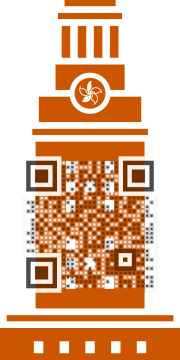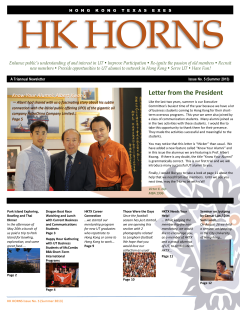
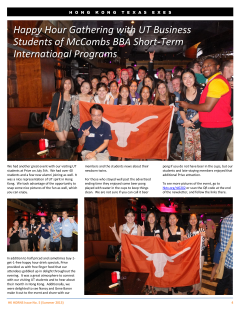
HK HORNS
Enhance public’s understanding of and interest in UT ‧ Improve Participation ‧ Re-ignite the passion of old members ‧ Recruit new members ‧ Provide opportunities to UT alumni to network in Hong Kong ‧ Serve UT ‧ Have Fun!
| A Triannual Newsletter |
Issue No. 5 (Summer 2013)
|
Know Your Alumni: Albert Kwong
… Albert had shared with us a fascinating story about his subtle connection with the initial public offering (IPO) of the gigantic oil company PetroChina Company Limited…

Page 5
Letter from the President
Like the last two years, summer is our Executive Committee’s busiest time of the year because we have a lot of business students coming to Hong Kong for their short-term overseas programs. This year we were also joined by a class of communication students. Many alumni joined us in the two activities with these students. I would like to take this opportunity to thank them for their presence. They made the activities successful and meaningful to the students.
You may notice that this letter is “thicker” than usual. We have added a new feature called “Know Your Alumni” and in this issue the alumnus we are featuring is Prof. Albert Kwong. If there is any doubt, the title “Know Your Alumni” is grammatically correct. This is our first trial and we will introduce many successful UT alumni to you.
Finally, I would like you to take a look at page 11 about the help that we need from our members. Until we see you next time, may the ‘Horns be with y’all!
Victor K. Nip
MBA 1996
Park Island Exploring, Bowling and Thai Dinner
In the afternoon of May 26th a bunch of us paid a trip to Park Island for bowling, exploration, and some great food….
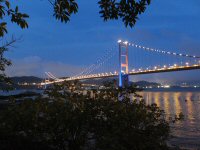
Page 2
Dragon Boat Race Watching and Lunch with Current Business and Communications Students
Page 3
Happy Hour Gathering with UT Business Students of McCombs BBA Short-Term International Programs
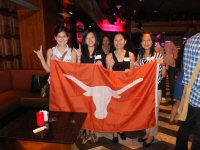
Page 4
HKTX Career Connection
…we started our mentorship program for new UT graduates who repatriate to Hong Kong or come to Hong Kong to work…
Page 9
Those Were the Days
Since the football season has just started, we are opening this section with 2 photographs related to Longhorn football. We hope that you would love our collection as usual …

Page 10
HKTX Needs Your Help!
… While keeping the membership fee non-mandatory, we would like to encourage you, as a member of HKTX and a proud alumnus of UT, to contribute to HKTX…
Page 11
Seminar on Jyutping by Caesar Lun / Dim Sum Lunch
On August 26 we held a seminar on Jyutping in the City University of Hong Kong…
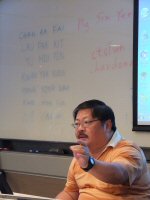
Page 12
Park Island Exploring, Bowling and Thai Dinner
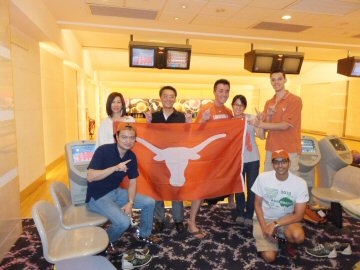
The Longhorn bowlers
In the afternoon of May 26th a bunch of us paid a trip to Park Island for bowling, exploration, and some great food. We gathered at the ferry pier in Central. A handful of us enjoyed our time chatting and catching up at the ferry pier, and was joined by those who were already on Park Island after taking the 2:30pm ferry.
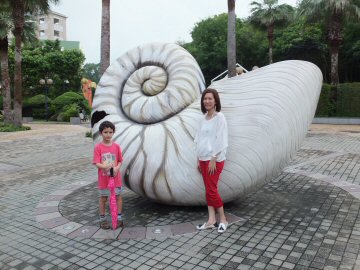
Once we arrived at Ma Wan we took some nice pictures around the ferry pier. After introductions, we headed to the Green Green Club for bowling. We managed to get two lanes for our 7 initial players. Later we had 2 additional people joining to make our group 9 in total. One of the highlights of our bowling time was one of our member’s young boy jumping around and doing cartwheels and more after every ball he bowled. It was a nice casual bowling time!
Next, we made our way to the beautiful Ma Wan Park. Everyone enjoyed taking many pictures of the outdoor murals, the amazing landscaping, and more. Ma Wan Park also offered our attendees a great deal of opportunities to learn more about plants and Mother Nature. We checked out the hilltop lookout, and we enjoyed a rest up at the top as well. The last part of the park we explored was a renewable energy learning area that describes solar, wind, and hydroelectric power in fairly simple terms.
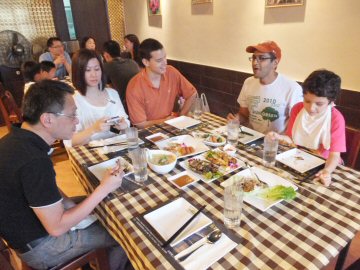
After bowling and so much exploring around Ma Wan, everyone was quite hungry. Thus, we went on to have a delightful dinner at the Pattaya Island Thai restaurant that was on the main public beach in Ma Wan. The Thai combo platter and the chicken, pork, and beef satay strips were major hits. Everyone loved the food and the atmosphere. It was also a great place to end a beautiful day and watch the sun go down. Once dinner was finished and darkness was set, the Tsing Ma Bridge was lit up in all its brilliance for our visitors to snap some more nice photos. It was a great end to a wonderful day.
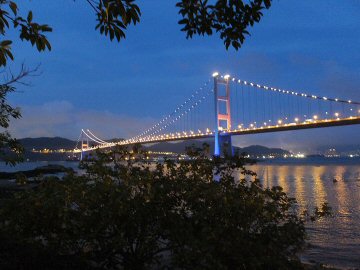
To see more pictures of the event, go to hktx.org/nl0202 or scan the QR code at the end of the newsletter, and follow the links there.
Dragon Boat Race Watching and Lunch with Current Business and Communications Students
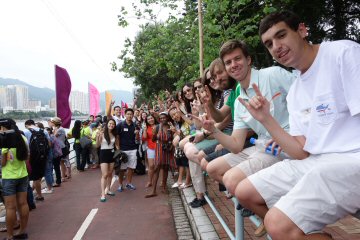
On June 12 we delighted some of our members and many of our visiting UT students with a new experience. It was the first time for most of the visiting UT students and some of our members to see a dragon boat race. In great UT glory our large group managed to occupy a decent amount of space along the Shatin waterfront. We did have a nice view of the beginning of the races, but we struggled to determine the winners. Nonetheless, it was a worthwhile experience for all, and it was an opportunity for the Hong Kongers to show off a special side of Hong Kong to our visiting students.
We continued showing off great things in Hong Kong to our visiting UT students by immersing them in the amazingness of Cantonese dim sum. A good handful might have had dim sum before, but they probably had not seen such an ample quantity of dim sum spread across their large 12+ people round table. As the literal translation of dim sum goes this feast touched our students’ and member’s hearts and filled their stomachs with tasty food.
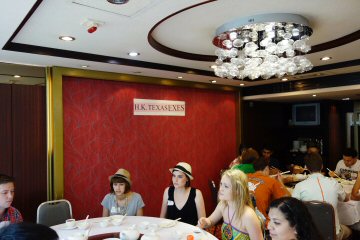
It was a day before our President’s birthday. We surprised Victor with a nice cake and card to celebrate the great success of this wonderful day that he made possible. Our VP also captured a great picture of all us after our hearts had been touched and new connections had been made.
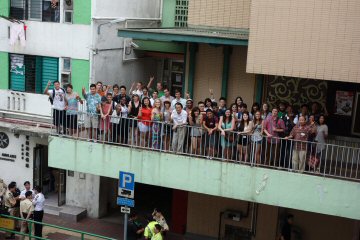
To see more pictures of the event, go to hktx.org/nl0202 or scan the QR code at the end of the newsletter, and follow the links there.
Happy Hour Gathering with UT Business Students of McCombs BBA Short-Term International Programs
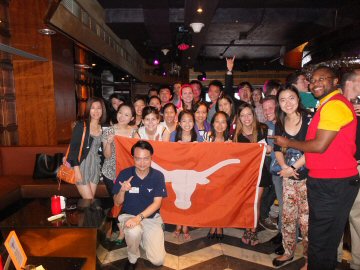
We had another great event with our visiting UT students at Prive on July 5th. We had over 40 students and a few new alumni joining as well. It was a nice representation of UT spirit in Hong Kong. We took advantage of the opportunity to snap some nice pictures of the fun as well, which you can enjoy.
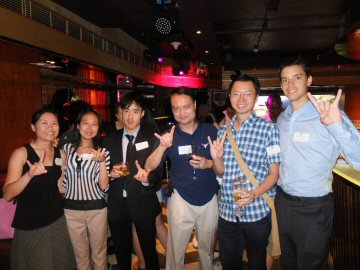
In addition to half priced and sometimes buy-1-get-1-free happy hour drink specials, Prive provided us with free finger food that our attendees gobbled up in delight throughout the evening. It was a great atmosphere to connect with our visiting UT students and to hear about their month in Hong Kong. Additionally, we were delighted to see Nancy and Gene Baron make it out to the event and share with our members and the students news about their newborn twins.
For those who stayed well past the advertised ending time they enjoyed some beer pong played with water in the cups to keep things clean. We are not sure if you can call it beer pong if you do not have beer in the cups, but our students and late-staying members enjoyed that additional Prive attraction.
To see more pictures of the event, go to hktx.org/nl0202 or scan the QR code at the end of the newsletter, and follow the links there.
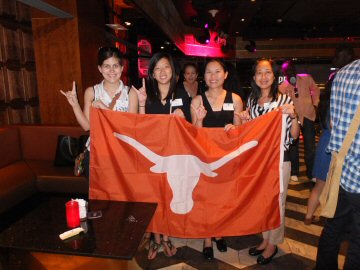
Know Your Alumni: Albert Kwong
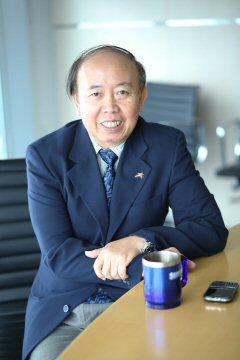
Some of you may remember seeing the name of Prof. Albert Kwong in our third issue of our newsletter. In that issue, Albert, our alumnus and a well-known oil industry expert, had allowed us to include an article of his, which was about the situation of oil supply in China and North Korea. Recalling one of our dinner gatherings a few years ago, Albert had shared with us a fascinating story about his subtle connection with the initial public offering (IPO) of the gigantic oil company PetroChina Company Limited (中國石油天然氣股份有限公司, SEHK: 0857, SSE: 601857, NYSE: PTR) in the year 2000 which is now ranked #9 on the Forbes Global 2000 list. Recently, we paid Albert a visit and collected more stories from him. Regardless whether you have met Albert in person, we hope by telling some of his stories, you will not only get to know him better, but also to feel proud of being one of us, the Longhorns from Hong Kong!
And the Story Starts…
He started his story from the time he graduated from secondary school in Hong Kong.
At that time, Albert had received offers from the Chinese University and Baptist College (now Baptist University), and was waitlisted by the University of Hong Kong’s medical school. Albert recalled that many of his friends and family were convincing him to stay in Hong Kong and be a civil servant for a stable career with stable income. But the young Albert was so eager to see the world. With strong determination, he chose to study abroad. In 1971, Albert took off to the U.S. with only US$2,000 in his hands, and made his way to the Pharmacy School at the University of South Carolina.
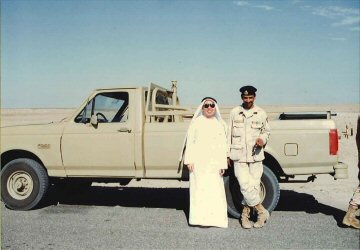
Upon his landing to the U.S. soil, Albert knew that he had to depend on himself. He went to work at a Greek restaurant the next day. During those days, the school charged the students flat-rate tuitions based on 15 hours of course credit. To save money and time, Albert took as many as 26 hours of credit a semester, while at the same time working 20 hours a week in two part-time jobs. Albert said he only got to sleep three to four hours a day. In order to save money, he chose to live in a dormitory which did not provide meal plans. That means on top of everything else, he had to buy grocery and cook for himself. Without money for a car, he bought a used bike, and later saved up for an old 1958 Ford bought for $50 and co-owned it with his roommate. The only time he could afford to drink a Coke or eat a hamburger was at the restaurant he worked at where food was provided free. Albert said, looking back at those days, his life was very tough but he was very happy because he was pursuing his dream. He worked in Chicago China Town during summers to save for his tuition. While most other foreign students depended on their parents financially, Albert was able to send money back home. He had proven himself as an outstanding and independent individual by finishing his degree at the University of South Carolina in just 3.5 years with a GPA above 3.8.
Enrollments to a US medical or pharmacy school were virtually reserved for local students back in those days. Albert was lucky to be accepted, but also unlucky to have to face a darker side: race discrimination. Being the only Chinese and Asian in his class, he recalled a professor in his 8 a.m. class who once said, “This Chinese boy is late again. Are all Chinese like that?” Hardly ever getting enough rest with long hours of work and school, Albert was once late for two minutes for this Pharmacy class. Harsh and discriminating words like that are certainly not welcomed nowadays. But back then things were different. On a side note, it was rumored that professor once had an argument with an Asian students, and after that he began to dislike Asians. In any case, that did not stop Albert from loving South Carolina and its friendly people. He recalled one time he and his roommates were stopped by plain cloth policeman for trespassing unintentionally but ended up eating home cooked fried chicken in the policeman’s home as an apology.
After a year and a half in college, Albert felt that pharmacy was not what he aimed for. He did not like the fact that practicing pharmacy involved strict memorization of drug names. He also did not like the working environment with sick patients or people in pain. In the early 70’s, computer science began to be a hot subject. Albert’s roommate was studying computer science, and Albert saw that there was a lot of potential in that field. Soon he switched his major from Pharmacy to Computer Science. That was the reason why he took 26 credit hours in a semester. He had to catch up. In spite of an intensified study environment, Albert was on the Dean’s Lists or the President’s Honor Roll (for GPA of 4.0) in seven semesters out of eight during his 3.5 years at the University of South Carolina.
Global changes and economic turmoil have affected and shaped us to become what we are now. Certainly, the same have affected Albert’s course of life. During the 1974 oil crisis, people queued up to pump gasoline. They even got into fights for it. Gas price skyrocketed at that time due to decreased supply as a result of the Arab embargo. Because both the country and our daily lives rely on oil, it had caught Albert’s attention, and he began to develop his interest in it. Albert said, as he started to learn more about the oil industry, he found the offshore rigs, which looked almost like battle ships to him, very fascinating. He envied the workers for taking helicopters to go to work. Albert had become an oil fanatic. He subscribed to oil industry magazines, and he put up pictures of oilrigs and offshore platforms onto his dormitory walls. One time as Albert was queuing up for gas, he thought that all gas stations were Shell, Exxon, Conoco, etc. He asked himself why there were no gas stations with Chinese brand names on it. He then had an idea that if he were to open a gas station one day, he would call it “PetroChina”. And that was the beginning of a dream.
On the Way to Austin
Approaching the end of Albert’s undergraduate studies, his roommate applied for a graduate degree in Computer Science. He decided to do something different. He did not want to just follow the crowd. Instead, he followed what he was truly interested in and applied for petroleum engineering schools. Having a 3.8 GPA was almost like having a free admission ticket to any school he wanted. Albert applied for three schools and all of them offered him scholarships. He was considering two of them: either the University of Texas or the University of Oklahoma. Albert had never been to either state. He chose UT at the end because he thought Texas was bigger and he believed that there were more opportunities in Texas. It was in Oklahoma, however, where Albert spent seven years later working in and his two children were born.
Leaving South Carolina, Albert sold his car, mailed all his belongings, and hopped onto a Greyhound bus to Austin. It was Christmas Eve of 1974 when everybody was celebrating the festival. Albert said he had this standing lamp which he found in a trash dump and used at his desk for studying all those years in South Carolina. Because the lamppost was too long, he could not send it by mail. So, he hand-carried it on his way to Austin. Bruce Lee was a big hit at that time. On the Greyhound, when the other passengers saw him as an Asian man with some sort of “kung-fu” equipment in his hands, Albert was mistaken as a kung-fu master, and was asked to demonstrate some of his moves! “I was the whitest man in the bus,” Albert joked, “yet I had fun and made many friends during the 30-hour hungry ride.”
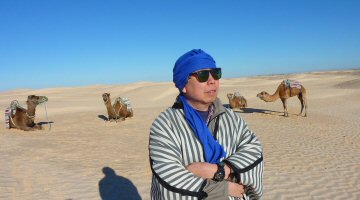
Upon his arrival at UT, the school’s Chinese Student Association (CSA) helped him to find a roommate who was also a student from Hong Kong. They also helped him find a cheap used car for $200. South Carolina had a more layback culture, while Texas was a booming state and everything was happening at a faster pace. Albert got a job as a research assistant at UT to support himself while being a graduate student. He worked in the Belcony Research Center and completed the MS program in two and a half years. He could have completed the program in two years, but it was very common at that time for foreign students to intentionally prolong their study time so that they had more time to find a suitable job within the country.
The Start of the Career
After earning his Master’s degree in Petroleum Engineering from UT in 1977, Albert took his first full-time job at Arco (now part of Tesoro), a national oil company, in Midland, Texas which is midway between Austin and El Paso. After a year, he was transferred to Tulsa, Oklahoma. Albert said he was living a pure American life, and it was the most comfortable period of his life. Since oil prices were again very high in late 70’s, Albert’s salary was already double of his peers in engineering positions of other industries. Albert had absolutely nailed down what we called the “American Dream” in Tulsa. He bought a house, got married, raised two children, and had a few cars plus a yacht to enjoy his weekends with. He also acquainted with some Texas oil tycoons and flew off on their private jets to the Caribbean for weekends or went deep sea fishing in the Bahamas. But living the “American Dream” was never enough for Albert. He thought it was better if he had moved to California or Alaska as there were more oil actions in these two states. Plus, he still wanted to see more of the world. He wanted to go international!
Coming Back to Asia
After a few years in Tulsa and working around the States, Albert sensed an opportunity upcoming. At that time, international oil companies with branches in China needed petroleum experts who were not only technically savvy but were also able to speak Chinese. So in 1983, putting a stable and comfortable life behind, Albert took a job at Sun Oil (later called Sunoco) and stationed in Zhanjiang (湛江), a fishing and naval port in southwestern China where the South China Sea oil drilling ventures were headquartered. He settled down his family in Hong Kong for the benefit of his children’s education. Before he left the United States, he sold his house, his cars, his yacht, and everything else in Tulsa except for some items of sentimental value. Albert said those items have been stored in Dallas for 30 years now. He also said that every oilman had a storage space somewhere, because they were always on the go, be the place a desert, or a city, or a jungle, or an oilrig miles offshore. “You go where you are needed, and you move where the black gold is, either by plane, by boat, by helicopter, or by car, staying in 6-star hotel today or in a desert or jungle camp eating army rations the next, working around the clock with no breaks for a month without seeing or talking to your family… These are part of the oil career package,” Albert said. He recalled that his longest period away from home was eleven months exploring oil in the mountains of southwest China.
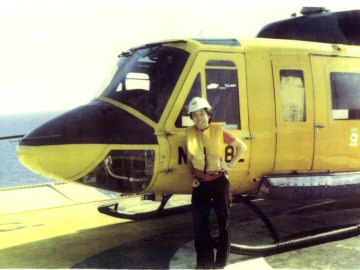
Albert worked in Zhanjiang for seven years as Sun Oil’s Technical Training Manager in their four offshore drilling ventures with the China National Offshore Oil Corporation (CNOOC). In 1990 he was transferred to Beijing to become the Chief China Representative for Sun Oil to liaise at governmental and ministry level. Quite the opposite to most other people approaching their mid-lives, at the age of 40, Albert decided to take his career to the next level. He thought it was about time he had started his own company. In 1994, he founded PetroChina Services, a consulting company which helped numerous international oil giants to enter the China market and in search of the black gold. You can see that he was using the trademark of his dream of many years. Albert ran his company for about ten years, a time period he said was a taste of another kind of life. Life was hectic but also challenging. Albert quoted Steve Job’s saying, “Your time is limited, don’t waste it living someone else’s life.” In those ten years, Albert had traveled around the globe on international projects. He had the chances to meet a lot of high-ranking Chinese officials and other countries’ VIP’s or ministers to deal with energy matters. Life was also enjoyable, only in a different way. He had stayed at 6-star hotels but also at a 6 yuan-per-night bunk at Lanzhou railway station. He had eaten in the most lavish banquet at the Great Hall of the People in Beijing with state dignitaries but also 2-yuan communal pot meals (大鑊飯) where washing your own dishes after the meal was a must.
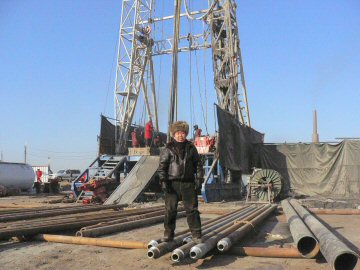
The Wall of Fame at PetroAsian marks many of the companies that Albert has worked with.
The “PetroChina” Story
If making a difference is one way of defining success, the IPO of PetroChina Company Limited in the year 2000 would certainly mark one of Albert’s successes. Known to only a small group of people, the English name of “PetroChina” was given by, or better said contributed by, Albert to his country. During the course of a worldwide IPO, being one of the largest companies in Asia as well as the biggest state-owned company in China, this listed arm of the state-owned China National Petroleum Corporation (CNPC) needed a decent English name. Goldman Sachs, the then financial advisor of the IPO, suggested a few English names to the company, yet only “PetroChina” sounded good to the ears to the decision makers. CNPC had gotten the right of the name “PetroChina” in all relevant markets except in Hong Kong because the name was already registered by Albert. Zhu Rongji (朱鎔基), the then Premier of the PRC (1998-2003), instructed the then Chairman of CNPC Jiang Jiemin (蔣潔敏) to contact Albert, hoping to buy the right from him. Albert could have easily asked for a fortune in return for giving up his right to use the name “PetroChina”. But Albert had a different thought. He said that it would be meaningless to ask for a small sum of money, but to ask for a large sum of money was the same as taking away many average Chinese citizen’s wages of many years. In those days, the average income per capita in China was only about US$950 per year. He was also considering another factor. He asked what name CNPC would choose if he refused to give up the right. He heard “PetroHua” (華油), a trademark that was dreadful and un-Western to Albert’s ears. Albert did not want to let it become a laughing stock to the Westerners, especially in front of the multinational oil giants. He thus made the decision to contribute the name “PetroChina”, a name that has been used by his company for over a decade, to the CNPC for free. He told us that in fact he did not see his contribution of the name as a loss, because he had always hoped to see gas stations with the name “PetroChina” in the U.S. and even all over the world one day. He knew he could never do it by himself. Albert saw his contribution as a way of fulfilling his own vision and a way to realize his dreams. “Life is a relay. Big goals take more than a generation to achieve and should involve many abled players. Let go and pass the torch to the capable,” he said. He then renamed his company “PetroAsian Energy”.
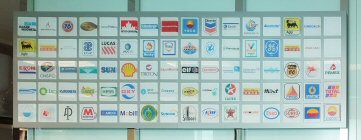
Albert’s contribution was posted on newspaper front pages at the time of PetroChina’s IPO, and he was then praised by China with eight characters in a couplet: “顧全大局,無私奉獻” (sacrificing oneself for the benefit of the whole). As an American-Chinese and a UT graduate, Albert takes pride in this contribution and he wishes to share this remarkable story with all faculty, staff, students, and graduates of the UT Department of Petroleum and Geosystems Engineering. He hopes that his story will be displayed in the department someday somehow. He said this will be a way to unite and improve the relationship between the students and experts from the two nations, and also to promote more academic cooperation between them.
PetroAsian
In 2003, Albert decided to temporarily close down his company so that he could allow himself to explore more about the world. As an oilman, he spent two years studying bio-fuel and alternative energy. In 2005, Albert was invited to join China Oil Resources Limited (now PetroAsian Energy Holdings Ltd., SEHK: 0850.HK) as Vice-Chairman and Chief Operating Officer. When Albert joined the company, its share was at one time trading at HK$0.03 per share, yet in just one and a half years since Albert joined the company, it was able to acquire a Tunisia oil concession and the stock price surged by over 40 folds to HK$1.4 per share. Under his leadership, the company rebranded itself with the new name “PetroAsian”.
Now and Tomorrow
Today, approaching his retirement, Albert is spending more time on writing, giving speeches, and having interviews. He has appeared on numerous media channels such as the Metro Finance, CNN, Bloomberg, China Global News, Arab News, Dallas Morning News, Texas Midland Reporter, Washington Post, and many Asian networks. He has written more than 200 oil related articles or commentaries and also had been relayed by the US Department of Commerce and many global websites. Aside from running the daily oil business at PetroAsian, he now has weekly oil related columns in two leading Hong Kong news media, and is in the process of finishing a book on oil and global geopolitics and military conflicts. Often referred to as the “Hong Kong /Asia oil guru”, Albert says, being a guru, you have to be able to digest the technical, the political, as well as the business aspects of the industry. You have to know it all! Once Albert retires, it will indeed be very hard to imagine if there is anyone else in the region who can replace him. “Oil is an interesting commodity. It is all geopolitics and military at the top. You have to know how the game is played in addition to the technical side.”
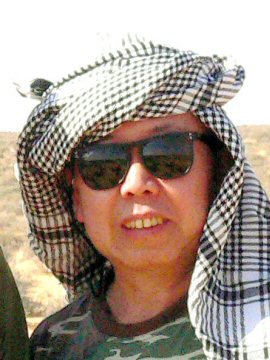
Albert enjoys being interviewed because he believes that his stories and his way of life can help youngsters and the next generation to find their paths to success. He said he would have liked to have some old and wise guys to talk to him when he was a teenager about success, paths of lives, what he should do, and what he should avoid. He said it is difficult to do one thing well, let alone 100 things. Therefore, he emphasized multiple times that to be successful, you need to stay highly focused and live life with a passion on what you believe.
The End of the Interview
To conclude the interview, Albert says we must always believe in our own dreams, be persistent and even stubborn sometimes. Otherwise, we will become just another piece of drifting wood down the flowing stream. He says we should never mind how others think of us, because the more we care about it, the more we deviate from our own dreams and path of success. He says we must be able to find happiness in our own way of living, and not living for others. He finds people who often show off themselves to others, to be slaves of the materialistic world, and are also growing hate instead of building friendships. He says the more we understand the beauty of the simplicity of life, the more we can earn from it. Simplicity does not create sins. Simplicity attracts opportunities. He says we must learn to accept others and be open-minded, because a person’s success is often limited by his own boundary and horizon. In terms of career, especially for youngsters, he suggests that they should not be too money-oriented. Interests should always come first. If the youngsters just want money, they can work in a funeral home. Money is good, and stable, too, because the industry is “recession-proof”. They will probably not get any complains, either. They will not want to be in it because they will not have interest in doing funerals. He added, though, that interest can only take us so far. It is passion that takes us all the way to success. Passion is working way beyond 5pm on the things that you like. Passion is the thing that drives you through hunger and loneliness, and gives you the courage to go to a frontier where no man has gone before. Then money will eventually come, and a lot of it, too, together with fun! Pure pursuit for money and materialism will lead to emptiness and an unfulfilling life.
After the Interview
Not long after the interview we received two pieces of good news about Albert. First, he has been conferred as an Adjunct Professor at the City University of Hong Kong. Second, Albert was awarded as the Distinguished Alumni Award of College of Engineering and Computing, University of South Carolina. He is the first Asian ever to receive this award in the 200 years of history of the university. He will visit the UofSC for the award ceremony this coming November.
About Albert:
Albert earned his BS degree in Computer Science at the University of South Carolina in 1974 with Phi Beta Kappa honors, and his MBA in Engineering Management and MS in Petroleum Engineering at the University of Texas at Austin in 1977. He is now the Vice Chairman and Chief Operating Officer of PetroAsian Energy Holdings Limited. He is a frequent speaker to the public on energy conservation, renewable energy, and Peak Oil.
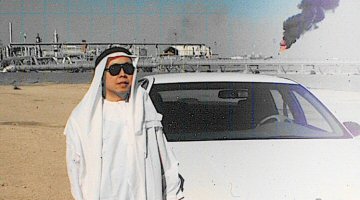
Albert is married and has a son and a daughter. His son graduated from the University of Washington with a business degree and then earned a Master’s degree in International Finance from the University of Southern California and London Business School. He is now a senior V.P. of a listed company in Hong Kong. Albert’s daughter has a degree in Food Science from California Polytechnic State University and a graduate degree from London’s Le Cordon Bleu Institute. She is now teaching domestic science at an international school in Hong Kong.
Approaching the age of retirement, Albert is still very active and highly sought after in the business world. He certainly is a role model for many of us. Albert said, one day when he retires, he will go to his storage in Dallas, TX to revisit his memories from over 30 years ago. Imaging him standing before the memory that he had stored away for so long, that would certainly be an amazing feeling.
Albert can be contacted at bransonlike@gmail.com.
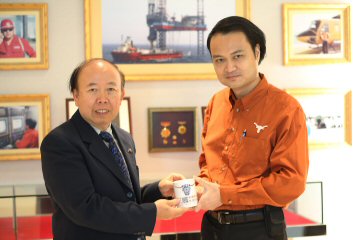
HKTX Career Connection

In the middle of last year, we started our mentorship program for new UT graduates who repatriate to Hong Kong or come to Hong Kong to work. We have decided to expand our career related program to include helping alumni to connect with experienced professionals in their interested fields and also one another.
The objectives of the program are as follows:
- To help our fresh graduates explore different career opportunities, build their careers, and build connections with other members and people in their interested fields
- To help alumni to get connected with experienced professionals of their interested career paths
- To build relationships among UT alumni in Hong Kong
- To build the membership of HKTX
Mentorship Program
The mentor-mentee relationship will officially last 12 calendar months. Mentors may give mentees advice on resume writing, exploring career paths, and interview techniques. Mentors can also take their mentees to meet other people in the industries that the mentees are interested in. Apart from career advice, mentors can also give advice on adapting to living in Hong Kong and on other issues. While there is flexibility in the eligibility of the mentors and mentees, below are the guidelines:
Mentor
- Has minimum 4 years of working experience, of which at least 1 year gained in Hong Kong
- Is a member of HKTX
- Normally resides in Hong Kong
- Is willing to meet each mentee at least once a quarter for 4 consecutive quarters
Mentee
- Graduated from UT less than 2 years ago
- Is a member of HKTX
- Normally resides in Hong Kong
- Wants to build his/her career in Hong Kong
- Is willing to meet his/her mentor at least once a quarter for 4 consecutive quarters
If you are otherwise eligible but are not a member yet, you may join us now.
To apply to become a mentor or a mentee, please visit https://hktx.org/Mentorship.htm.

The Horns Network
If you are a UT alumnus in Hong Kong interested in a certain field and want to talk to a Longhorn in that field, maybe we can help. If you are an alumnus planning to come to or come back to Hong Kong to work and want a lead, maybe we can help, too. Let us know what you want and we will try to connect you with members who are experienced professionals in your interested industry. We will also look into our Exco members’ UT connections and experienced professionals from other circles to help.
If you are a member who is an experienced professional in your field, we ask for your help. What we need from you is to take the first call from the help-seeking alumni. It will be up to you to decide whether you want to provide further help after taking the first calls.
To participate in Horns Connect, please visit https://hktx.org/TheHornsNetwork.htm.
Eligibility for help-seeking alumnus
- Is an alumnus of UT
- Is a member of HKTX if already in Hong Kong
- Is interested in developing his/her career in Hong Kong
Eligibility for Experienced Professional
- Is a member of HKTX
- Is experienced in his/her own industry
Connect thru LinkedIn
We have been using LinkedIn to connect our members (and our members only) for about a year. While the LinkedIn HKTX group (https://hktx.org/linkedin) is underutilized, our co-founder’s profile (https://hktx.org/connect) has connected more than 100 members in the professional network. LinkedIn is the best way to make your own connections with our fellow members on a DIY basis.
If you are a member and you have not connected with us through LinkedIn yet, please take action now. No forms required! If you are not a member yet and want to connect with our members, you may join us and get connected.

The brochure of the program can be downloaded from here:
https://hktx.org/CareerConnection.htm
Those Were the Days
Since the football season has just started, we are opening this section with 2 photographs related to Longhorn football. We hope that you would love our collection as usual.
Once again and again, have you looked at the bottom of your drawers yet? If you have any photos to share, please send them to us for our next issue!
- If you cannot see the label “1” in the above picture, it is not because of your poor eyesight. Well, it is put onto an unusual location, on top of the guy who was wearing the wrong color at a Texas football game. This picture is only taken 2 years ago, but we guarantee you that in every single Texas football home game you can see something similar. Go Horns!

- This picture that was taken on October 1, 2006 during the UT vs. Sam Houston State University game. The scoreboard speaks for itself and you can see that our wonderful UT Band spelled “TEXAS” for all to enjoy.

- This picture was taken from the top of the UT Tower. You can see part of the campus in the foreground, and Downtown Austin in the skyline. How nice to see these two areas in the same photo!
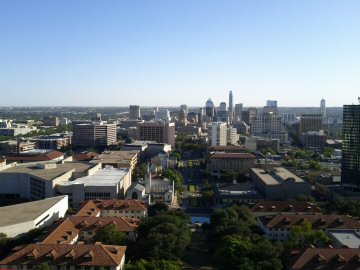
- Before Halloween was celebrated in Hong Kong by the younger generation, people in the US had been taking it seriously for a very long time. People dress up to pretend to be someone or even something they are not. In this picture submitted by Victor Nip, his classmate friend Dave Mehok was dressed up as Fred Flintstone in an MBA Halloween party held on Sixth Street. What is not in a photo was another classmate dressed up as a rejection letter by a prospective employer.
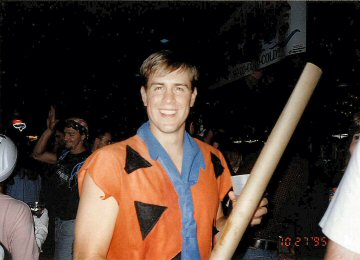
- This is not really “those days” but it leads in to the next one. This is a new part of Austin called Chinatown Center. Yep! A China Town in Austin! It is about 10 miles north of our campus on North Lamar Boulevard.
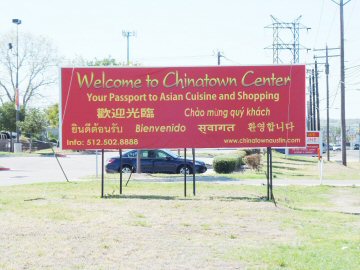
- Here is what really matters. Tien Hong Restaurant (天虹酒樓) on Burnet Road, which was opened in 1985, was closed in 2008 after 23 years of operation. It was a famous restaurant that almost every Hong Kong student had visited. The owner’s son has opened a small restaurant TC Noodle House (新記潮州麵家) in Chinatown Center. The old plaque of Tien Hong is now sitting inside a big corner of TC Noodle House.
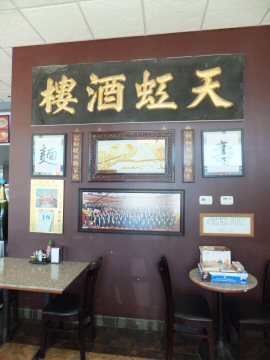
- This Longhorn statute has been standing in the parking lot of University Co-op for many many years, and has been a good spot for campus visitors to take pictures and commemorate their visit.
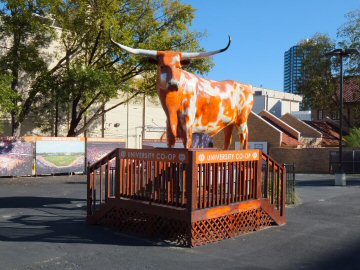
HKTX Needs Your Help!
Hong Kong Texas Exes has been striving to unite, inform and involve UT alumni and friends in Hong Kong for over ten years. By receiving our activity invitations and newsletters, you must be aware that we organize activities of different kinds all year round to fulfill our objectives. What you may not notice is that we also run a back office to support the operation. These tasks include but not limited to:
- Hosting the hktx.org website and managing a Facebook group to share information among members and friends
- Maintaining a bank account to manage the organizational funds
- Designing and producing awards and souvenirs for special guests and individuals with significant contributions to the organization and UT
- Liaising with UT and members regarding activity arrangement
Although our member helpers and Exco members help out as volunteers, we still have sizable expenses payable to third-parties, like bank charges and web-hosting fees. Due to the rise of various costs, the cash balance of the Organization has been slowly depleting in the past couple of years. While keeping the membership fee non-mandatory, we would like to encourage you, as members of HKTX and proud alumni of UT, to contribute to HKTX so that we will have the financial strength to continue serving our members and our school. Your gift can be sponsoring one of the following expense items (in HKD):
- Bank account monthly fee ($600 per year)
- Web-hosting annual fee ($456 per year)
- Communication charges for mobile phone SIM card ($200 per year)
- Putting a Slingbox in Texas Exes to stream Texas football and basketball games to Hong Kong (in consideration, $3,000)
Or you may make donation of $100, $200, or $500 to support the general administration expenses.
Of course, you may pay your voluntary membership fee of US$100/HKD750 for Lifetime Membership or US$15/HKD100 for Annual Membership. Also, buying our merchandise will also help (See the next article).
If you want to contribute, please deposit to the following HSBC account:
Hong Kong Texas Exes
400-634101-838
and notify us by email with the following information:
- Your name
- Date of deposit
- Amount of deposit
- Expense item you want to sponsor (optional)
If you have any questions or opinions about this call for contributions, please feel free to email us to discuss your views with us. We would appreciate your suggestions as well as your contribution.
HKTX Merchandise
There are only a few Ted (Texas Exes Dragon) mugs left! We will have a new design for the next batch of mugs. If you like this design, act now before all stock is gone!
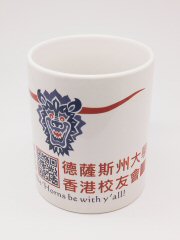
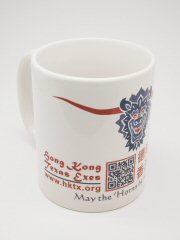
Coffee mug: HK$100
Write to us at hongkong@alumni.utexas.net if you are interested in the merchandise. The profit on the sale of our merchandise will help us in the running of the club.
Seminar on Jyutping by Caesar Lun / Dim Sum Lunch
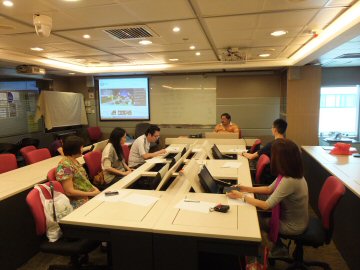
On August 26 we held a seminar on Jyutping at the City University of Hong Kong. Jyutping is a Cantonese Romanization scheme proposed by our alumnus Caesar Lun (BA 1981, MA 1985) ‘s team in Linguistic Society of Hong Kong. It is a scheme that is functionally similar to pinyin used in Mainland and the difference is that Jyutping is based on Cantonese, the dominant Chinese dialect used locally in Hong Kong. Such schemes are used for denoting the pronunciation of Chinese characters and are also implemented as Chinese input methods on computers nowadays. In this seminar, Caesar introduced the scheme and talked about using Jyutping input method on a PC. After the seminar, we went for a dim sum lunch inside the City University.
We have received very positive feedback. One of the attendee said he never knew how to type Chinese because of the complexity. Now he can use his mother tongue as a basis to do Chinese input. We would like to take this opportunity to thank Caesar for delivering the seminar for us!
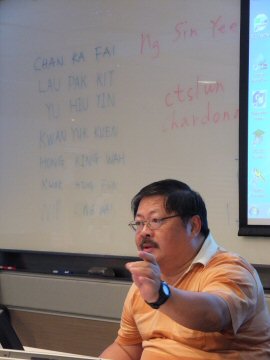
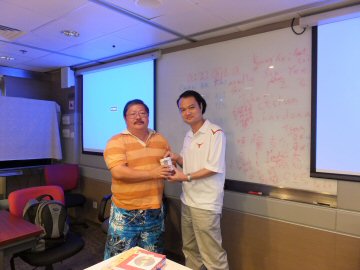
Final Words
We hope that you enjoyed reading this newsletter. If you have any comments about this newsletter, please do not hesitate to write to us at hongkong@alumni.utexas.net.
We also would like to urge you to contribute articles or photos for the next issue. It can be any news about yourself that you want to share with our fellow alumni. If you want to tell them about your business in the form of an advertisement, we can work that out, too. The next issue will be published in December. Until then, may the ‘Horns be with y’all!
Contact Hong Kong Texas Exes

Phone / WhatsApp: +852 6481 6005
Email: hongkong@alumni.utexas.net
Website: https://hktx.org/
Facebook: https://hktx.org/facebook
LinkedIn: https://hktx.org/linkedin
Photos: https://hktx.org/photos
About this Newsletter
Editorial Board
- Winson Chan
- Logan Hairgrove
- Victor K. Nip
